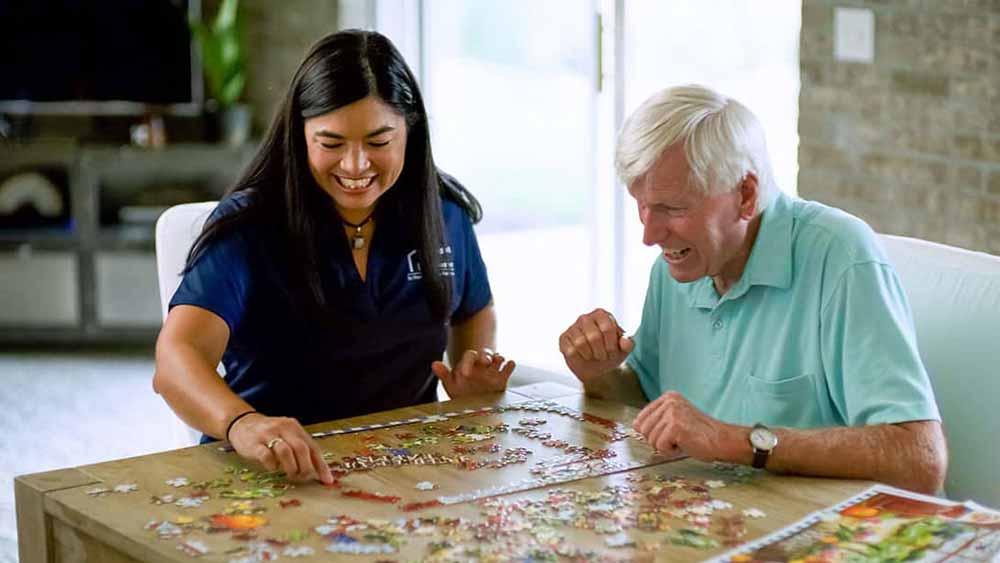

Interactive Activities for Families Supporting Dementia Patients
If your loved one has developed dementia, it may seem like the end of the world to you. Even though they are still right in front of you, they may not really be themselves. They may have reduced awareness or difficulty communicating. Alzheimer’s and other forms of dementia are degenerative brain diseases that rob people of many faculties that make them who they are. That’s why it feels like you’re losing the person you knew. However, it doesn’t mean you cannot interact, have a laugh or share memories with them. You just have to practice patience and think creatively. Most of all, you have to temper expectations and accept that what you wish for in engagement may not be within their capacity. And remember, as hard as it is, this is not about you; it’s about them.
June is Alzheimer’s and Brain Awareness Month, a good reminder that dementia affects millions of Americans. As the nation’s aging population grows, more families will continue to be affected. If that describes you, here are some ideas to help you plan engaging activities with your loved one who has dementia.
Finding Meaning in the Everyday
Meaningful connections can be found in everyday activities you do with your loved one who is cognitively impaired. Keep in mind that what may be meaningful to you and to them may differ due to their diminished perceptual or experiential capabilities. Experts recommend safe, simple, fun activities you and your loved one can participate in together. But remember that they may not respond to activities that once brought them joy.
Experts say having a routine of activities can improve a senior’s quality of life and help regulate mood and behavioral changes associated with dementia, such as sleep problems, aggression and agitation. One thing to consider is turning household chores into shared activities that help give your loved one a sense of purpose and productivity. Household tasks you and your loved one can do together include:
- Folding laundry.
- Sweeping or dusting.
- Raking leaves.
- Watering houseplants and garden plants.
- Preparing simple, healthy, fresh meals.
- Washing and drying dishes.
Activities To Try With Your Loved One
Here are some things you can do with your loved one who is experiencing dementia or cognitive change:
- Make a memory book from family photos.
- Listen to their favorite music.
- Watch their favorite show or movie.
- Do an easy arts and crafts project, such as coloring with crayons or watercolor painting.
- Knit or crochet.
- Give affection to a pet.
- Introduce an artifact representing happy memories; if it improves mood or stimulates conversation, use it as a touchstone.
- Tactile experiences can be soothing, so gather assorted soft fabrics in a container for your loved one to sift and sort through, letting them touch the different textures.
Activities Incorporating Movement
Chances are, you and your loved one could stand to move around more, so experiment with physical movement to see what they tolerate and enjoy. Here are some ideas:
- Take a light walk or jog on a wide, flat, well-maintained sidewalk, path or trail.
- Dance to music they like.
- Go to the gym and do easy workouts alongside each other, such as water aerobics.
- Improvise your own home gym with safe, simple household items that can double for weights or resistance bars.
- Do gardening activities.
- Stretch or do chair yoga.
- Visit an attraction or destination that involves some walking from room to room or site to site.
- Go to a park to feed the birds.
- Try an environmentally friendly, community beautifying activity by picking up litter from alleys or parks. Make sure you wear heavy gloves to protect against sharp objects.
Activity Ideas That Stimulate the Mind
Anything you can do to stimulate the mind, the better, so try any of the following activities:
- Play a board or card game with your loved one, or work a puzzle together.
- If your loved one can still read and track books or magazines, you can read to yourselves or aloud; or listen to audiobooks together.
- If your loved one is able, write cards or letters to friends and family.
- Surf the internet to virtually tour favorite destinations or bucket list places your loved one still wishes to visit.
Tips To Ensure You Are Being Present
It’s important to find activities that make your loved one feel a part of and included rather than disconnected or isolated. Here are some tips to help keep your loved one socially engaged:
- Sample different activities to see what your loved one likes and dislikes. Go slow and easy—don’t try to rush or force anything. At the first sign of frustration or irritation, cease or adapt the activity because the point is to make them feel engaged and valued, not upset and incompetent. Go with the flow.
- If you have children, bring them around to participate to whatever degree of interaction or engagement is possible.
- Even though your loved one may not respond as they once did, talk with them and listen. You can follow up on cues indicating what they like to reminisce about or discuss.
- If the conversation isn’t happening, don’t fret. Even just sitting outside on your porch or deck or a park bench to watch passersby or the clouds or stars can be a meaningful activity because you are intimately present in your loved one’s life.
- Not much or anything at all has to be said. Eye contact, facial expressions and physical proximity can say a lot, too. Meaningful contact or connection is what matters.
How Right at Home Can Help
Right at Home can help care for your loved one experiencing the effects of dementia and cognitive change. Our trained caregivers can also provide respite for the family caregiver who may just need a break to recharge. We can offer a customized care plan combining companionship, homemaking and personal care services to ensure your loved one stays engaged and safe at home. Find out about our dementia and cognitive support program that helps families stay connected. Or, contact the Right at Home office nearest you for more information.







